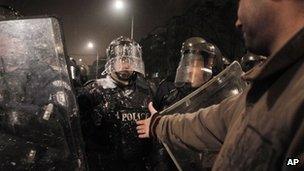Bulgaria government to resign, PM Boiko Borisov says
- Published

The government's resignation follows nationwide protests against high electricity prices
Bulgaria's government has announced it is resigning after nationwide protests against high electricity prices and austerity measures, Prime Minister Boiko Borisov has said.
The PM said he had decided to go after protesters against rising electricity prices clashed with police in Sofia.
At least 14 people were injured during Tuesday's demonstrations.
"I will not participate in a government under which police are beating people," Mr Borisov said.
"Every drop of blood is a shame for us,"
Low living standards
The street protests across Bulgaria - the EU's poorest country - which began two weeks ago, were initially over high electricity prices but soon took an anti-government turn.
The PM tried to calm the protests on Tuesday by promising to slash prices and by sacking his finance minister.
He also pledged to punish foreign-owned power companies that he said charged too much.
But the BBC's Central Europe correspondent Nick Thorpe says that the clashes on Tuesday were the last straw for Mr Borisov.
Many Bulgarians remain deeply unhappy over high energy costs, power monopolies, low living standards and corruption.
'We did our best'
Parliament will vote on the resignation on Thursday. If it is accepted, President Rosen Plevneliev, a political ally of the prime minister, will have to appoint an interim government to rule until the next parliamentary elections., our correspondent says.
It was not immediately clear whether or not a parliamentary election scheduled for July would now be brought forward.
"Our power was handed to us by the people, today we are handing it back to them," Mr Borisov said.
"I cannot stand looking at a bloody Eagles' Bridge," he added, referring to a busy road junction in the centre of Sofia that became the centre point of clashes between police and protesters on Tuesday.
"We did our best over these four years."
Many of the protesters in Sofia and other major Bulgarian cities had demanded the resignation of the centre-right GERB party government and the re-nationalisation of power distributors.
The government lost support after it abandoned plans in March 2012 to build a new nuclear power station at Belene, close to the Romanian border.
A controversial referendum last month on whether to build a second nuclear power plant was invalidated by a low turnout, although more than 60% of those who voted backed the idea.
Correspondents say that while budget cuts have felled a series of governments around Europe, Mr Borisov - a former bodyguard to Bulgaria's Soviet-era dictator Todor Zhivkov - had until recent weeks seemed relatively immune.
That was in part because he froze salaries and pensions rather than cutting them.
Bulgarians on average earn a relatively meagre 800 levs ($550;£356) a month.
- Published27 January 2013
- Published25 January 2013
- Published28 March 2012